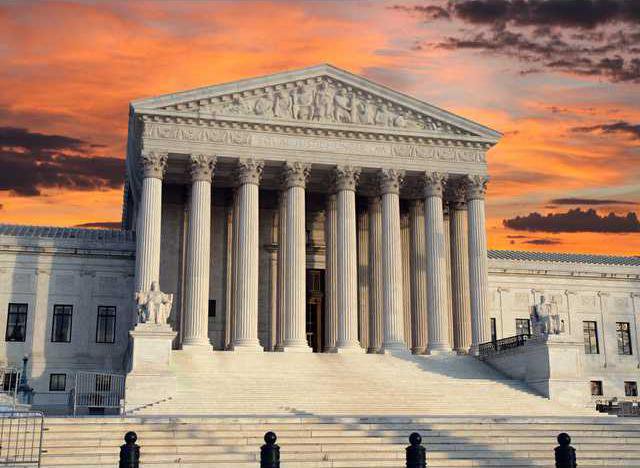In a predictable "surprise" Tuesday, the Supreme Court left standing a lower court decision that affirmed the power of teacher unions to require contributions from non-union members to pay for the cost of collective bargaining.
The decision, a 4-4 split that did not decide the issue but rather left standing the decision of the 9th Circuit Appeals Court, was "unexpected," CNN reports. But it was only unexpected if you forget that Justice Antonin Scalia died suddenly in February.
At oral arguments in January, it seemed clear that five justices, including the usual swing vote Anthony Kennedy, were skeptical of the union position. Scalia's death untipped the scales to a 4-4 tie.
At stake is whether being forced to contribute to a union constituted coerced political speech.
"Under federal law, schoolteachers cannot be required to join a union," Deseret News National reported in January. "However, in 22 states plus the District of Columbia, teachers are required to pay 'agency fees,' or the cost of that part of the union dues that is dedicated to negotiating contracts. In California, that means that while union members pay roughly $1,000 a year in dues, those who opt out get about 30 percent of that refunded."
The U.S. Supreme Court today rejected a political ploy to silence public employees like teachers, school bus drivers, cafeteria workers, higher education faculty and other educators to work together to shape their profession, said NEA President Lily Eskelsen Garca, the Los Angeles Times reported.
The plaintiffs were represented by the Center for Individual Rights, which, CNN notes, "argued that the fees violated its First Amendment right against compelled speech and urged the court to overturn precedent that held that while the unions could not mandate fees from nonmembers for ideological or political advocacy, it could charge for collective bargaining that goes to issues, such as wages and grievances."
Along with 10 named teachers, the plaintiff group also included the Christian Educators Association International that argued that the dominant teacher unions are extremely hostile to their membership.
There has been a growing frustration among people of faith, Finn Laursen, CEAI's executive street, told The Daily Signal in January. The union leadership is so far left now that it sees anything that is godly as the enemy.
The Center for Individual Rights, which represented the plaintiffs in the case, has vowed to file for a rehearing, noting on its website that "by law, a tie vote by the Supreme Court does not settle a legal question; it simply leaves the lower court opinion in place and reserves the legal question for a future case."
"Fortunately," CIR adds, "there are many examples in the last several decades of the Court rehearing closely contested cases involving fundamental individual rights once a new Justice joined the bench."
The decision, a 4-4 split that did not decide the issue but rather left standing the decision of the 9th Circuit Appeals Court, was "unexpected," CNN reports. But it was only unexpected if you forget that Justice Antonin Scalia died suddenly in February.
At oral arguments in January, it seemed clear that five justices, including the usual swing vote Anthony Kennedy, were skeptical of the union position. Scalia's death untipped the scales to a 4-4 tie.
At stake is whether being forced to contribute to a union constituted coerced political speech.
"Under federal law, schoolteachers cannot be required to join a union," Deseret News National reported in January. "However, in 22 states plus the District of Columbia, teachers are required to pay 'agency fees,' or the cost of that part of the union dues that is dedicated to negotiating contracts. In California, that means that while union members pay roughly $1,000 a year in dues, those who opt out get about 30 percent of that refunded."
The U.S. Supreme Court today rejected a political ploy to silence public employees like teachers, school bus drivers, cafeteria workers, higher education faculty and other educators to work together to shape their profession, said NEA President Lily Eskelsen Garca, the Los Angeles Times reported.
The plaintiffs were represented by the Center for Individual Rights, which, CNN notes, "argued that the fees violated its First Amendment right against compelled speech and urged the court to overturn precedent that held that while the unions could not mandate fees from nonmembers for ideological or political advocacy, it could charge for collective bargaining that goes to issues, such as wages and grievances."
Along with 10 named teachers, the plaintiff group also included the Christian Educators Association International that argued that the dominant teacher unions are extremely hostile to their membership.
There has been a growing frustration among people of faith, Finn Laursen, CEAI's executive street, told The Daily Signal in January. The union leadership is so far left now that it sees anything that is godly as the enemy.
The Center for Individual Rights, which represented the plaintiffs in the case, has vowed to file for a rehearing, noting on its website that "by law, a tie vote by the Supreme Court does not settle a legal question; it simply leaves the lower court opinion in place and reserves the legal question for a future case."
"Fortunately," CIR adds, "there are many examples in the last several decades of the Court rehearing closely contested cases involving fundamental individual rights once a new Justice joined the bench."

